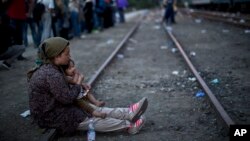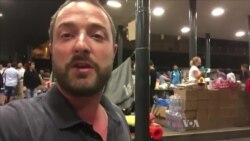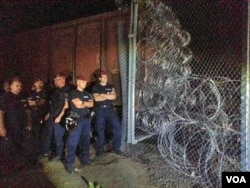Hungary blocked its main migrant crossing point from Serbia on Monday, hours ahead of imposing tough new laws aimed at halting the massive stream of Middle East refugees headed into the country on their way to Germany and other western European countries.
Dozens of police, supported by mounted police and soldiers, stood guard on a railway track that asylum seekers had been using to cross into the European Union. A helicopter hovered overhead.
Hungarian Prime Minister Viktor Orban, Europe's most outspoken foe against allowing thousands of refugees from war-torn Syria and elsewhere into the EU, spoke at a police cadet swearing-in ceremony in Budapest.
WATCH: Henry Ridgwell reports from the Keleti Railway Station in Budapest
He said the new laws against the migrants call for prison terms and the punishment for human traffickers "will be so severe that it will be really deserved."
"Hungary is a country with a 1,000-year-old Christian culture," Orban noted. "We Hungarians don't want the global-sized movement of people to change Hungary. This is not what we worked for and this is not why we battled through world wars, communism, the change of regime after communism and an economic crisis. We had and have a different concept of the Hungarian and European future. We want to live in order, peace and security. We don't want chaos."
Hungary rolled a rail container car lined from top to bottom with razor wire onto the entry point near Roszke, entirely blocking the passageway. Budapest said anyone entering illegally will face criminal charges, but it sent refugees seeking asylum to a nearby police supervised border crossing. Authorities there allowed hundreds to board buses bound for Austria.
WATCH: Luis Ramirez reports from the Munich train station
Germany
Meanwhile, Germany's new border checkpoints caused traffic jams as long as 20 kilometers in Austria.
Germany, which has welcomed thousands of refugees into its territory over the opposition of some of its European neighbors, said it started the checkpoints Sunday to institute "a more orderly process."
Austria said it also would impose checkpoints on its border with Hungary, while Slovakia renewed checkpoints on its borders with Austria and Hungary.
European interior ministers failed Monday to agree on a plan to relocate 120,000 migrants across the European Union.
While a majority of the ministers support the plan for binding quotas, many of the objections came from Eastern European nations, including Hungary and Slovakia. Their borders are among the first stops for migrants trying to get to Western Europe.
The ministers did agree on an earlier plan to relocate 40,000 migrants now in Greece and Italy.
Some European leaders blame Germany for openly welcoming migrants to the continent trying to flee war and terror in Syria and elsewhere. Germany has become increasingly frustrated with some EU members who are reluctant to share the burden.
Germany could take in as many as a million refugees this year, Vice Chancellor Sigmar Gabriel predicted in a letter Monday to members of his Social Democratic Party. Chancellor Angela Merkel has said Germany is willing to absorb 800,000 migrants.
Perilous journey
Many of the refugees do not want to settle in just any country. Some are literally walking through several countries to reach Germany. German Interior Minister Thomas de Maiziere said people seeking protection cannot choose the country where they receive it.
More than 430,000 migrants seeking a better life, including refugees from Syria and Iraq, have crossed the Mediterranean Sea to Europe this year. Nearly 3,000 have died trying, the International Organization for Migration says. That figure crept higher Sunday when at least 28 people drowned off Greece after their boat capsized. Scores more were rescued near the island of Farmakonisi in the southeastern Aegean Sea.
Austrian police say they rescued 42 people believed to be migrants stowed in a refrigerated flower truck on a highway near the German border on Sunday. Two Iraqis suspected of being smugglers were arrested, police said.
Authorities are on high alert after the decomposing remains of 71 people believed to be migrants were found on an eastern Austrian highway last month.
The EU is divided on accepting the refugees.
EU ministers meeting
European Union interior ministers are meeting to discuss ways to spread responsibility for the seemingly endless flow of refugees into Europe.
The ministers are at odds over the proposal by the EU's executive arm to impose mandatory distribution quotas for asylum seekers from Africa, the Middle East and Asia who have overwhelmed three front-line states in particular: Greece, Hungary and Italy.
Arriving at the Brussels talks, Slovak Interior Minister Robert Kalinak said the march of migrants through Europe in recent days shows quotas don't work.
"We think that quotas are not the solution," Kalinak said, "…the first step, how to stop the flow, and how to help the people who are still in camps in Turkey and Jordan and Lebanon."
Germany says it may receive one million migrants this year - 200,000 more than previously estimated. Germany and Sweden accepted the EU's highest number of asylum seekers last year.
Many of the refugees, a majority of whom come from conflict-torn nations like Syria, Iraq and Somalia do not want to settle into just any country. Some are literally walking through several countries to reach Germany. German Interior Minister Thomas de Maiziere said people seeking protection cannot choose the country where they receive it.
Swedish Justice and Migration Minister Morgan Johansson said Europe has the means to welcome them all. Sweden is among several EU members,including Germany, that support mandatory refugee quotas.
Cameron meets refugees
In a previously unannounced move, British Prime Minister David Cameron met Monday in Lebanon with some of the Syrian refugees who will re-settle in Britain.
Britain is taking in up to 20,000 refugees over the next five years. Cameron also met with his Lebanese counterpart, Tammam Salam.








